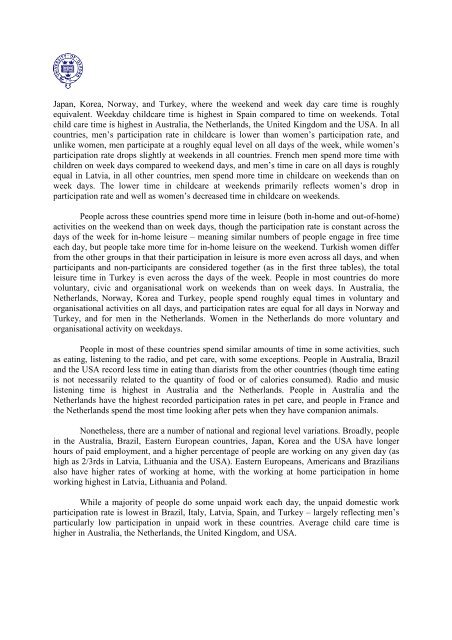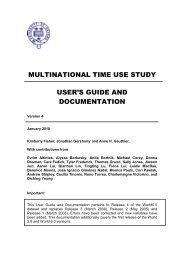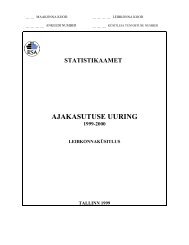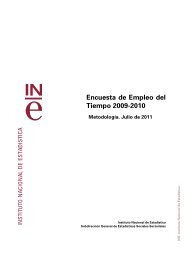Diary Evidence of Average Daily Time Spent in Thirty Activities
Diary Evidence of Average Daily Time Spent in Thirty Activities
Diary Evidence of Average Daily Time Spent in Thirty Activities
Create successful ePaper yourself
Turn your PDF publications into a flip-book with our unique Google optimized e-Paper software.
Japan, Korea, Norway, and Turkey, where the weekend and week day care time is roughlyequivalent. Weekday childcare time is highest <strong>in</strong> Spa<strong>in</strong> compared to time on weekends. Totalchild care time is highest <strong>in</strong> Australia, the Netherlands, the United K<strong>in</strong>gdom and the USA. In allcountries, men’s participation rate <strong>in</strong> childcare is lower than women’s participation rate, andunlike women, men participate at a roughly equal level on all days <strong>of</strong> the week, while women’sparticipation rate drops slightly at weekends <strong>in</strong> all countries. French men spend more time withchildren on week days compared to weekend days, and men’s time <strong>in</strong> care on all days is roughlyequal <strong>in</strong> Latvia, <strong>in</strong> all other countries, men spend more time <strong>in</strong> childcare on weekends than onweek days. The lower time <strong>in</strong> childcare at weekends primarily reflects women’s drop <strong>in</strong>participation rate and well as women’s decreased time <strong>in</strong> childcare on weekends.People across these countries spend more time <strong>in</strong> leisure (both <strong>in</strong>-home and out-<strong>of</strong>-home)activities on the weekend than on week days, though the participation rate is constant across thedays <strong>of</strong> the week for <strong>in</strong>-home leisure – mean<strong>in</strong>g similar numbers <strong>of</strong> people engage <strong>in</strong> free timeeach day, but people take more time for <strong>in</strong>-home leisure on the weekend. Turkish women differfrom the other groups <strong>in</strong> that their participation <strong>in</strong> leisure is more even across all days, and whenparticipants and non-participants are considered together (as <strong>in</strong> the first three tables), the totalleisure time <strong>in</strong> Turkey is even across the days <strong>of</strong> the week. People <strong>in</strong> most countries do morevoluntary, civic and organisational work on weekends than on week days. In Australia, theNetherlands, Norway, Korea and Turkey, people spend roughly equal times <strong>in</strong> voluntary andorganisational activities on all days, and participation rates are equal for all days <strong>in</strong> Norway andTurkey, and for men <strong>in</strong> the Netherlands. Women <strong>in</strong> the Netherlands do more voluntary andorganisational activity on weekdays.People <strong>in</strong> most <strong>of</strong> these countries spend similar amounts <strong>of</strong> time <strong>in</strong> some activities, suchas eat<strong>in</strong>g, listen<strong>in</strong>g to the radio, and pet care, with some exceptions. People <strong>in</strong> Australia, Braziland the USA record less time <strong>in</strong> eat<strong>in</strong>g than diarists from the other countries (though time eat<strong>in</strong>gis not necessarily related to the quantity <strong>of</strong> food or <strong>of</strong> calories consumed). Radio and musiclisten<strong>in</strong>g time is highest <strong>in</strong> Australia and the Netherlands. People <strong>in</strong> Australia and theNetherlands have the highest recorded participation rates <strong>in</strong> pet care, and people <strong>in</strong> France andthe Netherlands spend the most time look<strong>in</strong>g after pets when they have companion animals.Nonetheless, there are a number <strong>of</strong> national and regional level variations. Broadly, people<strong>in</strong> the Australia, Brazil, Eastern European countries, Japan, Korea and the USA have longerhours <strong>of</strong> paid employment, and a higher percentage <strong>of</strong> people are work<strong>in</strong>g on any given day (ashigh as 2/3rds <strong>in</strong> Latvia, Lithuania and the USA). Eastern Europeans, Americans and Braziliansalso have higher rates <strong>of</strong> work<strong>in</strong>g at home, with the work<strong>in</strong>g at home participation <strong>in</strong> homework<strong>in</strong>g highest <strong>in</strong> Latvia, Lithuania and Poland.While a majority <strong>of</strong> people do some unpaid work each day, the unpaid domestic workparticipation rate is lowest <strong>in</strong> Brazil, Italy, Latvia, Spa<strong>in</strong>, and Turkey – largely reflect<strong>in</strong>g men’sparticularly low participation <strong>in</strong> unpaid work <strong>in</strong> these countries. <strong>Average</strong> child care time ishigher <strong>in</strong> Australia, the Netherlands, the United K<strong>in</strong>gdom, and USA.








